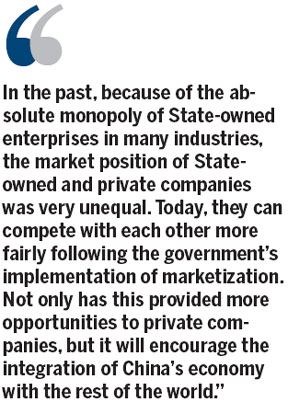Reforms to benefit HK
Updated: 2013-12-09 07:04
By Eddy Li(HK Edition)
|
|||||||||
It has been almost a month since the Third Plenary Session of the 18th CPC Central Committee ended - but new economic reforms announced after the plenary will have considerable future benefits. 
As someone representing the business community, I pay close attention to economic policies. The policies advocated by the central government have two key aspects: One is "marketization" - the greater use of free market forces. The other is the economic opportunities which will emerge as State-owned enterprises go through substantial reforms. Both policies will be beneficial to Hong Kong.
Marketization is what the Hong Kong companies on the mainland have been longing for. This is because they have suffered from intervention by local governments. At the behest of governments, companies were obliged to meet many requirements, even though these sometimes contradicted market demands. Now, the central government has made a decision of great significance "to let the market decide the allocation of resources". This shows its determination to reduce government intervention and promote market forces.
This shift of focus will certainly generate tremendous impetus for private companies, including Hong Kong-funded ones. In the past, because of the absolute monopoly of State-owned enterprises in many industries, the market position of State-owned and private companies was very unequal. Today, they can compete with each other more fairly following the government's implementation of marketization. Not only has this provided more opportunities to private companies, but it will encourage the integration of China's economy with the rest of the world. In addition, Hong Kong is experienced in helping private companies enter the international market, so many opportunities will develop in Hong Kong. 
But a good policy is only effective when it can be implemented properly. From my point of view, the success of marketization requires a complete legal system. It depends on the effectiveness of anti-corruption measures, because corruption is a major factor holding China back. This was also clearly noted in the Global Competitiveness Report released by the World Economic Forum a couple of months ago - in which China was ranked 29th.
Fortunately, the report on judicial reform, another significant aspect of the recent reforms, clearly states that the implementation of independent judicial system relies on the guarantee of judicial rights. The plenary report used approximately 1,300 words to focus on anti-corruption strategies in the future, outlining concrete regulations for civil servants and establishing anti-graft teams to deal with undesirable work habits. These include using money to gain advantages, abusing power, bribery, and excessive bureaucracy and extravagance.
If the government succeeds in this area, then law-obeying Hong Kong enterprises will benefit. The central government should, therefore, attach greater importance to anti-graft measures. Inspiring slogans are pointless without stricter law enforcement.
The author is vice-president of the Chinese Manufacturers' Association of Hong Kong.
(HK Edition 12/09/2013 page9)